1995 CHEVROLET S10 engine
[x] Cancel search: enginePage 153 of 354
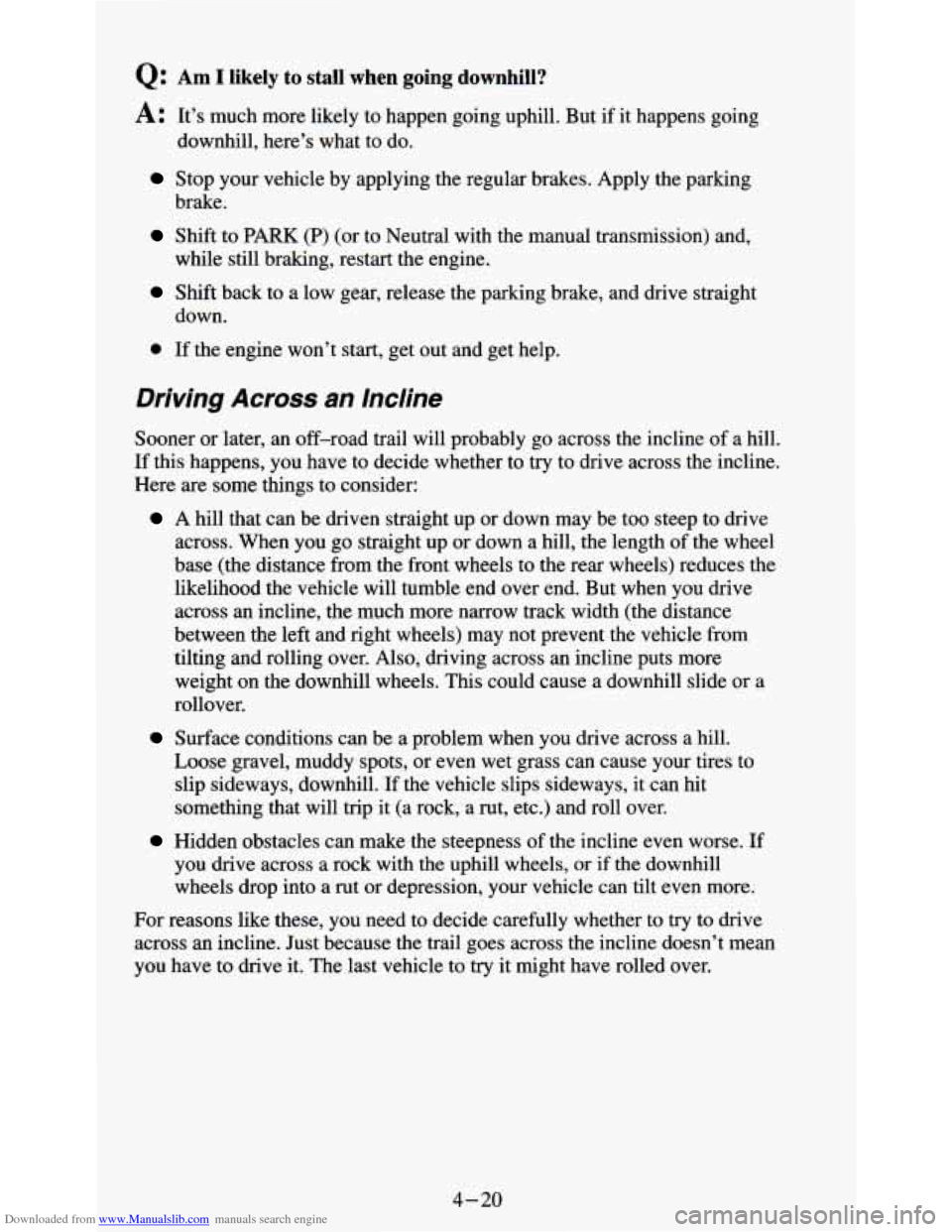
Downloaded from www.Manualslib.com manuals search engine Q: Am I likely to stall when going downhill?
A: It’s much more likely to happen going uphill. But if it happens going
downhill, here’s what to do.
Stop your vehicle by applying the regular brakes. Apply the parking
brake.
Shift to PARK (P) (or to Neutral with the manual transmission) and,
while still braking, restart the engine.
Shift back to a low gear, release the parking brake, and drive straight
down.
0 If the engine won’t start, get out and get help.
Driving Across an lncline
Sooner or later, an off-road trail will probably go across the incline of a hill.
If this happens, you have to decide whether to
try to drive across the incline.
Here are some things to consider:
A hill that can be driven straight up or down may be too steep to drive
across. When you go straight up or down a hill, the length of the wheel
base (the distance from the front wheels to the rear wheels) reduces the
likelihood the vehicle will tumble end over end. But when you drive
across an incline, the much more narrow track width (the distance
between the left and right wheels) may not prevent the vehicle from
tilting and rolling over. Also, driving across an incline puts more
weight on the downhill wheels. This could cause a downhill slide or a
rollover.
Surface conditions can be a problem when you drive across a hill.
Loose gravel, muddy spots, or even wet grass can cause your tires to
slip sideways, downhill. If the vehicle slips sideways, it can hit
something that will trip it (a rock,
a rut, etc.) and roll over.
Hidden obstacles can make the steepness of the incline even worse. If
you drive across a rock with the uphill wheels, or if the downhill
wheels drop into a rut or depression, your vehicle can tilt even more.
For reasons like these, you need to decide carefully whether
to try to drive
across an incline. Just because the trail goes across the incline doesn’t mean
you have to drive it. The last vehicle to try it might have rolled over.
4-20
Page 154 of 354
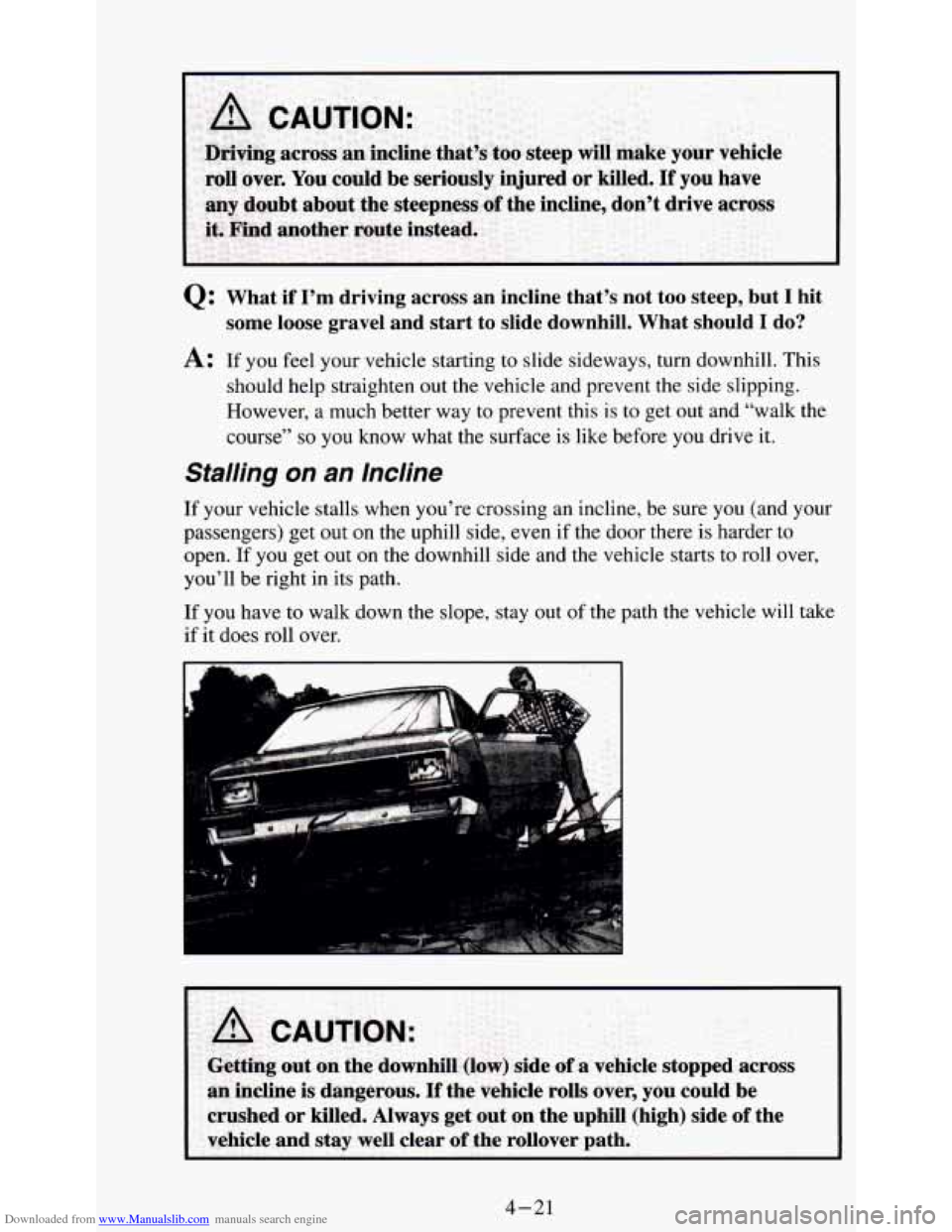
Downloaded from www.Manualslib.com manuals search engine Q: What if I’m driving across an incline that’s not too ste\
ep, but I hit
A: If you feel your vehicle starting to slide sideways, turn downhill. This
should help straighten out the vehicle and prevent the side slipping.
However, a much better way to prevent this is to get out and “walk the
course”
so you know what the surface is like before you drive it.
some loose gravel and start to slide downhill. What should I do?
Stalling on an Incline
If your vehicle stalls when you’re crossing an incline, be sure you (and your
passengers) get out on
the uphill side, even if the door there is harder to
open.
If you get out on the downhill side and the vehicle starts to roll over,
you’ll be right in its path.
If you have to walk down the slope, stay out of the path the vehicle will take
if it does roll over.
4-21
Page 155 of 354
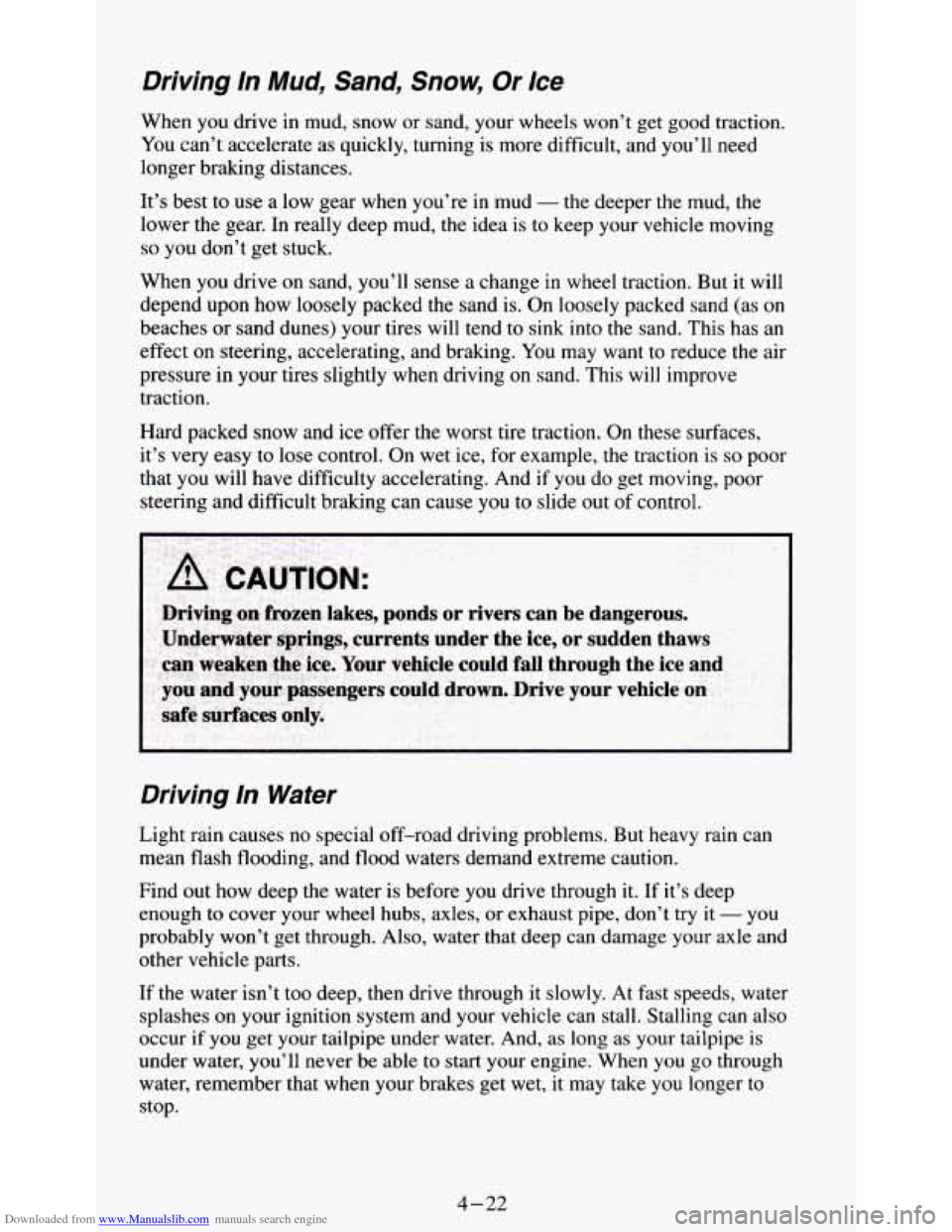
Downloaded from www.Manualslib.com manuals search engine Driving In Mud, Sand, Snow, Or Ice
When you drive in mud, snow or sand, your wheels won’t get good traction.
You can’t accelerate as quickly, turning is more difficult, and you’ll need
longer braking distances.
It’s best
to use a low gear when you’re in mud - the deeper the mud, the
lower the gear.
In really deep mud, the idea is to keep your vehicle moving
so you don’t get stuck.
When
you drive 6fi Sad, you’ll sense a change in wheel traction. But it will
depend upon how loosely packed the sand is. On loosely packed sand (as
on
beaches or sand dunes) your tires will tend to sink into the sand. This has an
effect on steering, accelerating, and braking. You may want to reduce the air
pressure in your tires slightly when driving on sand. This will improve
traction.
Hard packed snow and ice offer the worst tire traction. On these surfaces.
it’s very easy to lose control. On wet ice, for example, the traction is
so poor
that you will have difficulty accelerating. And if
you do get moving, poor
steering and difficult braking can cause
you to slide out of control.
Driving In Water
Light rain causes no special off-road driving problems. But heavy rain can
mean flash flooding, and flood waters demand extreme caution.
Find out how deep the water is before
you drive through it. If it’s deep
enough to cover your wheel hubs, axles, or exhaust pipe, don’t try it
- you
probably won’t get through. Also, water that deep can damage your axle and
other vehicle parts.
If the water isn’t too deep, then drive through it slowly. At fwt speeds, water
splashes
on your ignition system and your vehicle can stall. Stalling can also
occur if you get your tailpipe under water. And, as long as your tailpipe is
under water, you’ll never be able
to start your engine. When you go through
water, remember that when your brakes get wet, it may take you longer to
stop.
4-22
Page 156 of 354
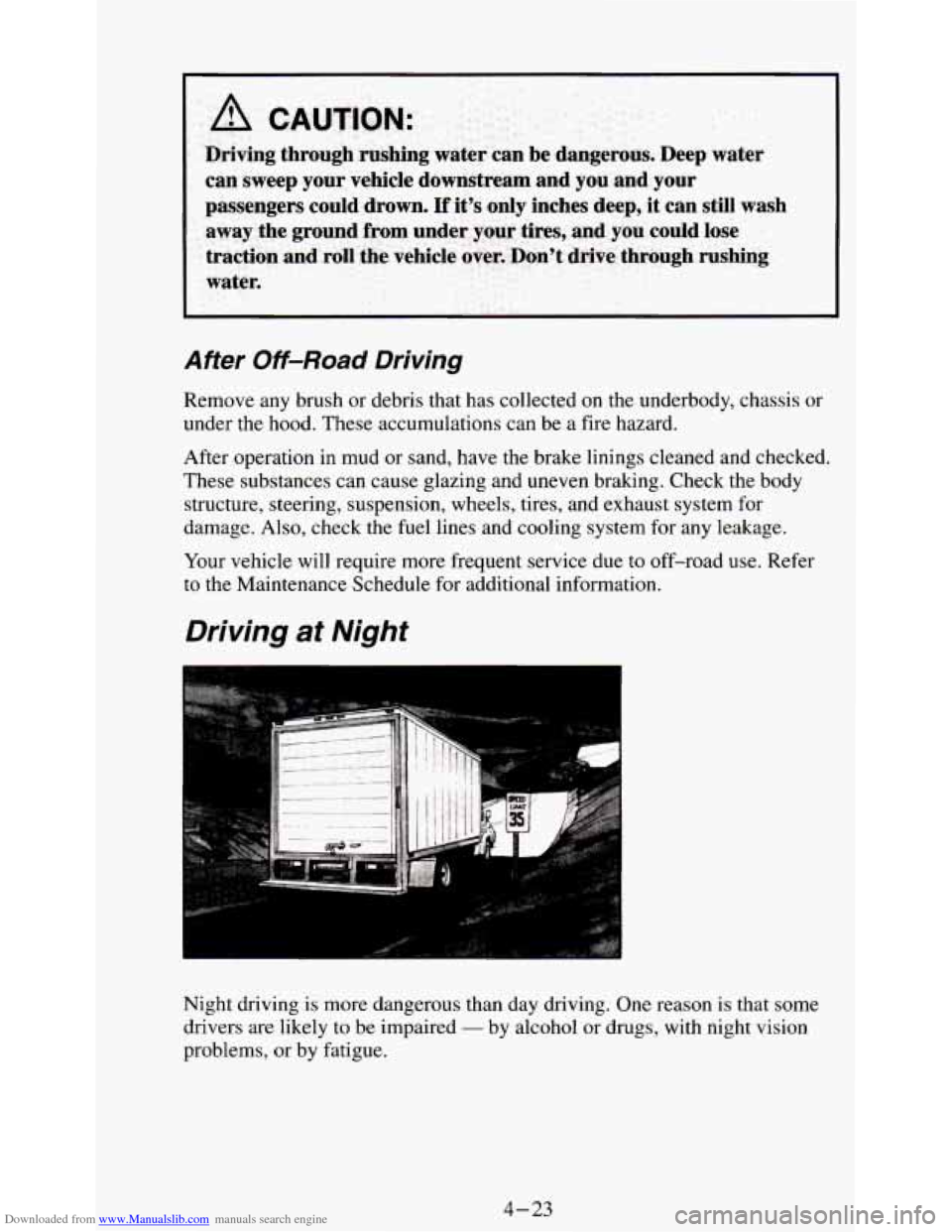
Downloaded from www.Manualslib.com manuals search engine Driving through rushing water can be dangerous. Deep water can sweep your vehicle downstream and you and your
passengers
could drown. If it’s only inches deep, it can still wash
away the ground from under your tires, and you could lose
traction and roll the vehicle over. Ron’t drive through rush\
ing water.
After Off-Road Driving
Remove any brush or debris that has collected on the underbody, chassis or
under the hood. These accumulations can be a fire hazard.
After operation in mud
or sand, have the brake linings cleaned and checked.
These substances can cause glazing and uneven braking. Check the body
structure, steering, suspension, wheels, tires, and exhaust system for
damage. Also, check the fuel lines and cooling system for any leakage.
Your vehicle will require more frequent service due to off-road
use. Refer
to the Maintenance Schedule for additional information.
Driving at Night
Night driving is more dangerous than day driving. One reason is that some
drivers
are likely to be impaired - by alcohol or drugs, with night vision
problems, or by fatigue.
4-23
Page 157 of 354
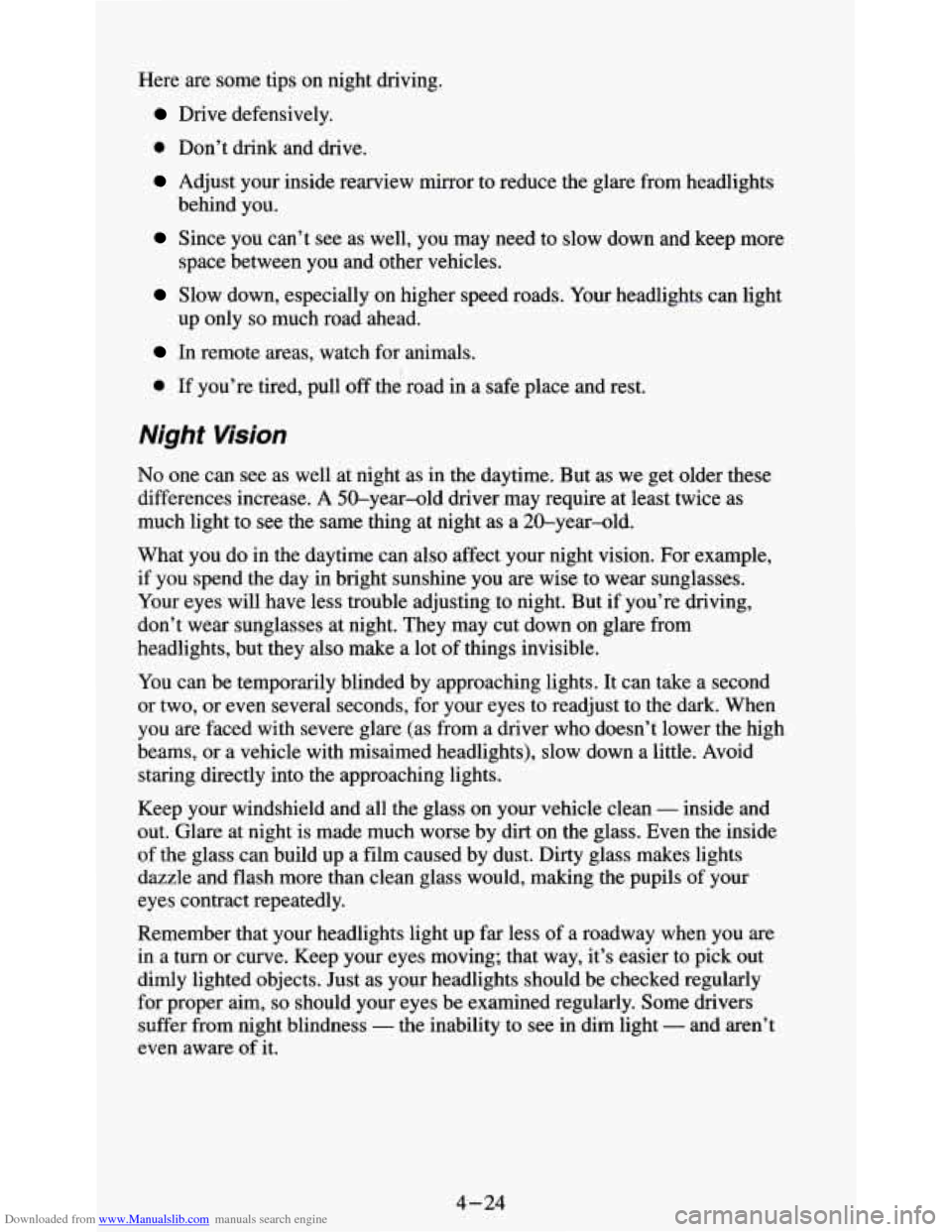
Downloaded from www.Manualslib.com manuals search engine Here are some tips on night driving.
Drive defensively.
0 Don’t drink and drive.
Adjust your inside rearview mirror to reduce the glare from headlights
Since you can’t see as well, you may need to slow down and keep more
behind you.
space
between you and other vehicles.
Slow down, especially on higher speed roads. Your headlights can light
up
only so much road ahead.
In remote areas, watch for animals.
0 If you’re tired, pull off the road in a safe place and rest.
Night Vision
No one can see as well at night as in the daytime. But as we get older these
differences increase. A 50-year-old driver may require at least twice as
much light to see the same thing at night as a 20-year-old.
What you do in the daytime can also affect your night vision.
For example,
if you spend the day in bright sunshine you
are wise to wear sunglasses.
Your eyes will have less trouble adjusting to night. But
if you’re driving,
don’t wear sunglasses at night. They may cut down on glare from
headlights, but they also make a lot of things invisible.
You can be temporarily blinded by approaching lights. It can take a second
or
two, or even several seconds, for your eyes to readjust to the dark. When
you
are faced with severe glare (as from a driver who doesn’t lower the high
beams, or a vehicle with misaimed headlights), slow down a little. Avoid
staring directly into the approaching lights.
Keep your windshield and all the glass on your vehicle clean
- inside and
out. Glare at night is made much worse by dirt on the glass. Even the inside
of the glass can build up a film caused by dust. Dirty glass makes lights
dazzle and flash more than clean glass would, making
the pupils of your
eyes contract repeatedly.
Remember that your headlights light up far less of a roadway when you
are
in a turn or curve. Keep your eyes moving; that way, it’s easier to pick out
dimly lighted objects. Just as your headlights should be checked regularly
for proper aim,
so should your eyes be examined regularly. Some drivers
suffer from night blindness
- the inability to see in dim light - and aren’t
even aware
of it,
4-24
Page 158 of 354
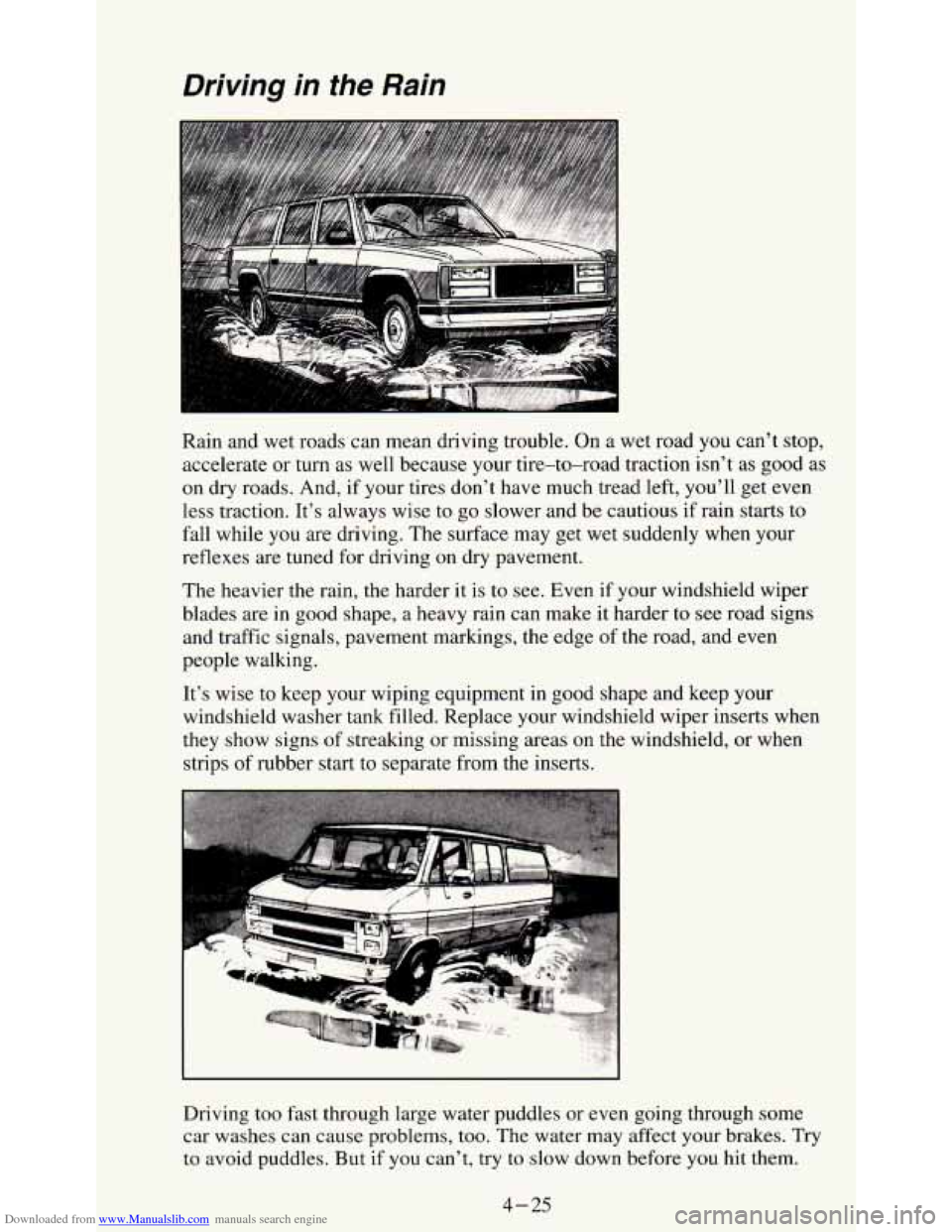
Downloaded from www.Manualslib.com manuals search engine Driving in the Rain
Rain and wet roads can mean driving trouble. On a wet road you can’t stop,
accelerate or
turn as well because your tire-to-road traction isn’t as good as
on dry roads. And, if your tires don’t have much tread left, you’ll get even
less traction. It’s always wise to go slower and be cautious if rain starts to
fall while you are driving. The surface may get wet suddenly when your
reflexes are tuned for driving on dry pavement.
The heavier the rain, the harder it is to see. Even if your windshield wiper
blades are in good shape, a heavy rain can make it harder to see road signs
and traffic signals, pavement markings, the edge
of the road, and even
people walking.
It’s wise to keep your wiping equipment
in good shape and keep your
windshield washer tank filled. Replace your windshield wiper inserts when
they show signs
of streaking or missing areas on the windshield, or when
strips of rubber start to separate from the inserts.
I I
Driving too fast through large water puddles or even going through some
car washes can cause problems,
too. The water may affect your brakes. Try
to avoid puddles. But
if you can’t, try to slow down before you hit them.
4-25
Page 159 of 354
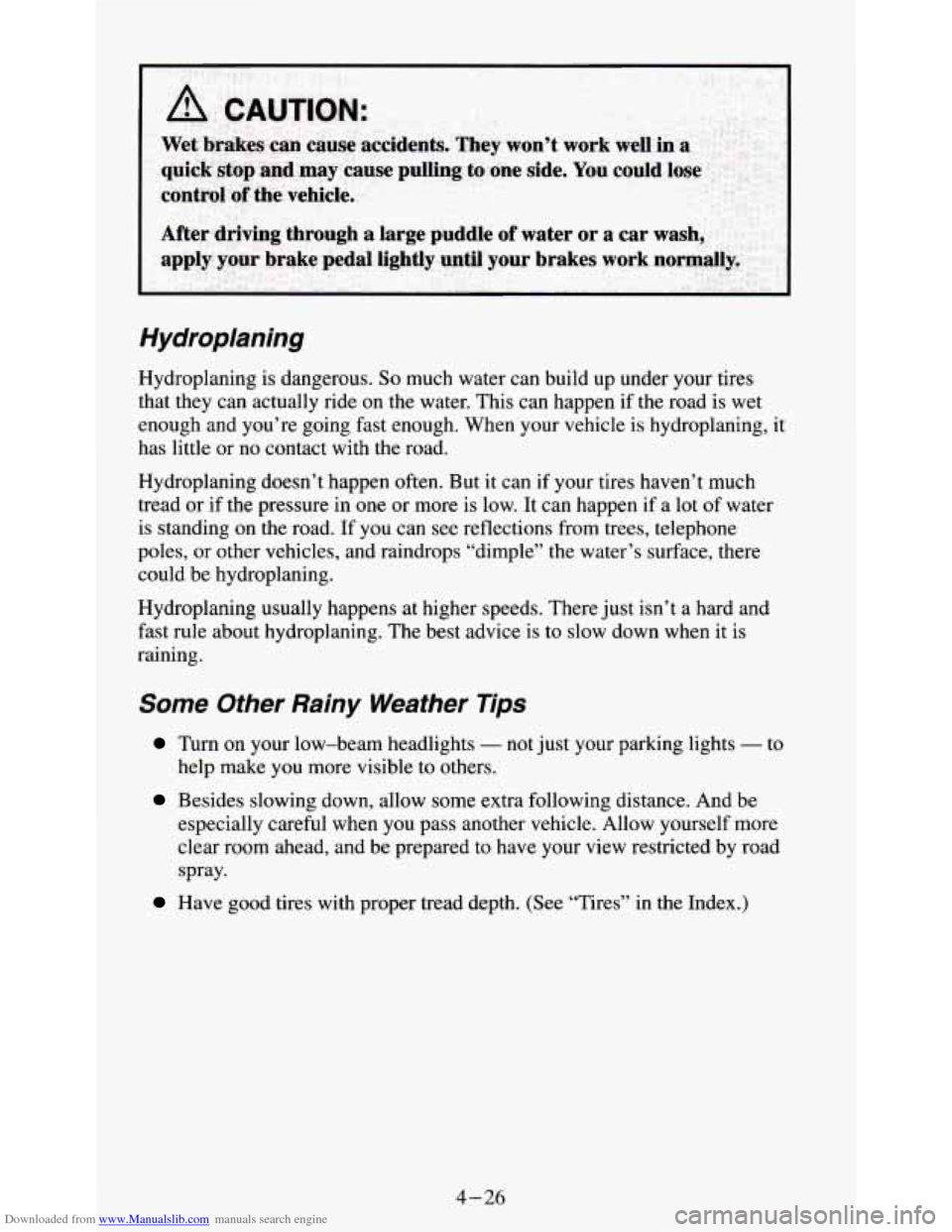
Downloaded from www.Manualslib.com manuals search engine Hydroplaning
Hydroplaning is dangerous. So much water can build up under your tires
that they can actually ride on the water. This can happen if the road
is wet
enough and you’re going fast enough. When your vehicle is hydroplaning, it
has little or
no contact with the road.
Hydroplaning doesn’t happen often. But it can if your tires haven’t much
tread or if the pressure in one or more is low. It can happen if a lot
of water
is standing on the road. If
you can see reflections from trees, telephone
poles,
or other vehicles, and raindrops “dimple” the water’s surface, th\
ere
could be hydroplaning.
Hydroplaning usually happens at higher speeds. There just isn’t
a hard and
fast rule about hydroplaning.
The best advice is to slow down when it is
raining.
Some Other Rainy Weather Tips
Turn on your low-beam headlights - not just your parking lights - to
help make you more visible to others.
Besides slowing down, allow some extra following distance. And be
especially careful when you pass another vehicle. Allow yourself more
clear room ahead, and be prepared
to have your view restricted by road
spray.
Have good tires with proper tread depth. (See “Tires” in the Index.)
4-26
Page 160 of 354
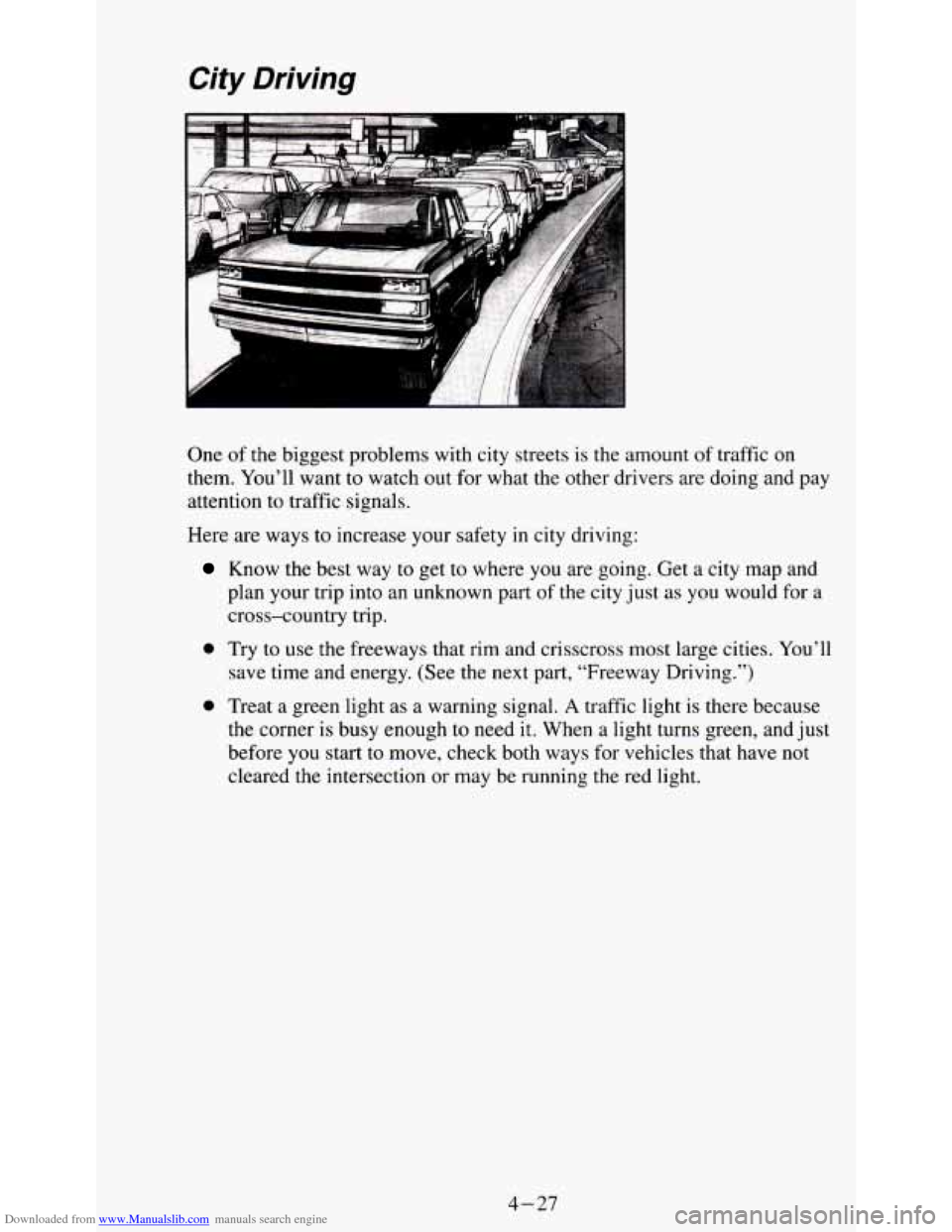
Downloaded from www.Manualslib.com manuals search engine City Driving
One of the biggest problems with city streets is the amount of traffic on
them. You’ll want to watch out for what the other drivers are doing and pay
attention to traffic signals.
Here are ways to increase your safety in city driving:
Know the best way to get to where you are going. Get a city map and
plan your trip into an unknown part of the city just
as you would for a
cross-country trip.
0 Try to use the freeways that rim and crisscross most large cities. You’ll
save time and energy. (See the next part, “Freeway Driving.”)
0 Treat a green light as a warning signal. A traffic light is there because
the corner is busy enough to need it. When a light turns green, and just
before you start to move, check both ways for vehicles that have not
cleared the intersection
or may be running the red light.
4-27